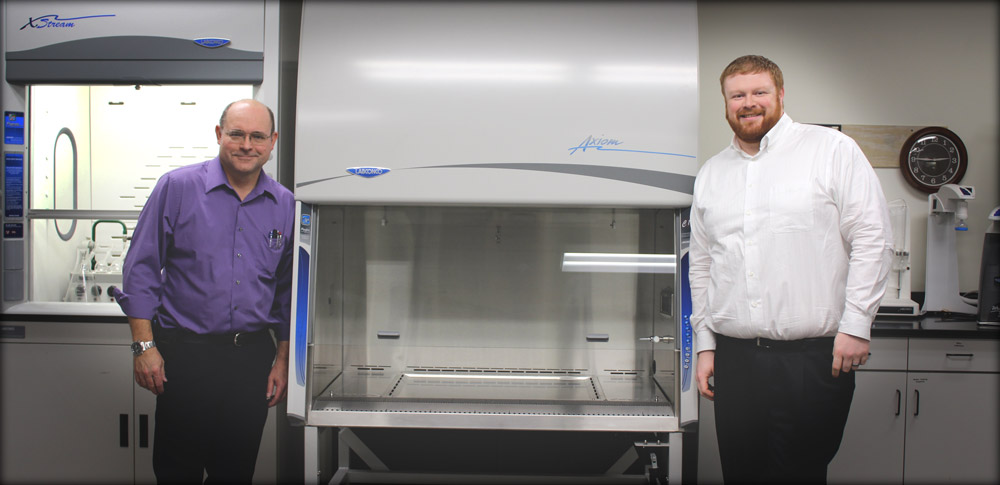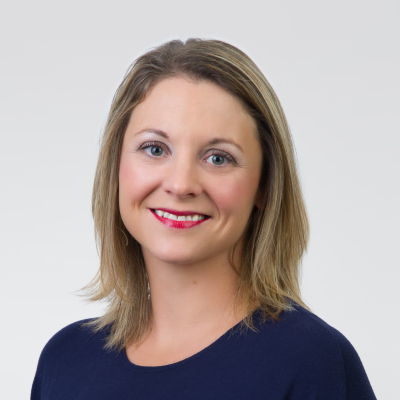Q&A: The Brains Behind the BSC No-Brainer
The recently released Purifier® Axiom™ is an entirely new type of biosafety cabinet. The Class II, Type C1 can function in either Type A or Type B mode, offering flexibility and increased efficiency in the process. It is truly the first of its kind.

Jim Hunter (pictured left), Senior Products Engineer, and Brian Garrett (pictured right), Product Manager, played essential roles in designing the Axiom and developing the innovative Type C1 technology.
Let's pick (some of) the brains behind the BSC No-Brainer.
What do you want people to remember about the Axiom?
BG: I think it is sort of like a Swiss Army* knife. It does a lot of things, and it does them well. If you need ducting, don't need ducting or don't really know exactly what you need in terms of applications, it still works.
JH: We were trying to develop a "thinking cabinet" in a lot of ways. Think of the Active Protection Protocol™, which is an extra safety feature. The machine is actively trying to protect you, giving you more time to exit a potentially dangerous situation. Features like that stand out to me.
What was the biggest challenge you faced when developing the Axiom?
BG: I have to say that the biggest challenge was actually getting it to work—going from ideation into a physical thing. From a design standpoint, it was getting the two different systems to work harmoniously. Another challenge has been market acceptance and adoption by regulatory agencies. It will take time.
JH: Right now, the biggest challenge is trying to get the Type C cabinet through the regulatory agencies. It's new, so it can be difficult to adapt to it. I have had day-long conversations about whether the Axiom is a Type A or Type B. It's neither alone because it's both. The users in the field I talk to seem to be genuinely interested in this technology, so we'll get there.
Is there anything you're especially proud of about the Axiom?
BG: I'm really proud of the Active Protection Protocol feature. That programming sequence came out of conversations that Jim and I had about B2 requirements and what is necessary to alert a user in case of an exhaust failure. We just wanted to maintain safety for as long as we could, and we achieved that. I have pride from a company standpoint, too. With the Type C1, there was a lot of R & D and a lot of failure along the way. Labconco allowed Jim and I the flexibility to fail and to ultimately get to something that has the chance to really revolutionize how biosafety is handled in the laboratory.
JH: I think it was cool that this was really a large coordinated effort from a lot of people in the company. Mark (Mark Schmitz, Vice President of Engineering and Research) saw what we were doing and encouraged us. He really helped with the Chem-Zone™ Work Surface. Brian (Brian Hays, Design Engineer) made the machine work as far as the ductwork and the arrangement of components. This wasn't a formal project until we had a prototype running. It was a group of people working on something that we, frankly, didn't even know would work. I'm proud of the group effort and of being in an environment willing to take a risk on something like this.
What other projects have you worked on during your time at Labconco?
BG: My first active project in this role was the Purifier® Logic® upgrade and redesign that resulted in the Logic®+ launch in early 2013. Concurrent with the Axiom project, I'm also co-leading the product design for the Protector® Echo™ Filtered Fume Hood.
JH: Oh, man—a lot. I've been here for 30 years this May. I've designed several generations of biosafety cabinets and had a hand in other projects, like the animal handling equipment, small enclosures and WaterPro® Systems.
What was it like working as a team on this project?
BG: Working with Jim is always an adventure. There's typically a flurry of activity and brainstorming, and then he goes into the trenches and starts working on stuff—whether it's a good idea or a bad idea. This repeats over and over. Then, once we get to what we like, we start tearing it apart. Jim gets really energized when it comes to innovation. So, this particular project has been really fun because he gets very excited about how this will look in the field and how other companies will respond to it.
JH: Working with Brian is easy because there's a synergy there. I get so enthralled putting the machine together and getting it to run that sometimes I don't see the big picture. Then, Brian makes a suggestion that I would have never considered. He just offers a different perspective and sees long-term implications other than getting the equipment going. We balance each other out.
What makes you good at what you do?
BG: In my career before Labconco, I transitioned from managing procedures to maintaining a lab system to managing an entire lab. When I came to this company, I started in product service. I came to know the nuts and bolts of how the systems worked, really understanding airflow. Now I’m in charge of the whole system from ideation to fruition and can work with engineering. That's good because I'm a big picture person.
My degree is in ecology and evolutionary theory; actually, in a lot of ways, marketing and ecology are sort of the same thing. You play in a very small arena, but you have to know how everything affects everything else and what all those things mean to each other. If you can figure that out, you have an advantage. I have been on the bench, and I can make a product that serves an essential purpose and also fills big-picture needs.
JH: I am actually a microbiologist, but I grew up in a family of engineers. My father and both my grandfathers were engineers, so I learned to solve mechanical problems at a fairly young age. That part never really left me, I suppose.
In grad school, I had a knack for working on the water purification systems, and this is where it has taken me. I like working with machinery; technically, though, I really am a biologist—although my wife, who is a microbiologist, would say that's not true. It's an interesting mix, really: I see the customers' perspective, manufacturing perspective and sales perspective at once.
When you're not designing revolutionary laboratory equipment, how do you spend your time?
BG: It depends on the season. When it's warm, I love the outdoors. I like camping and hiking, and I recently took up duck hunting. In winter, I spend a lot of time in my woodshop working on whatever I can. I built my son's Christmas present this year.
JH: My brother and I like to tinker around with radio-controlled models. I also like traveling with my wife. We have two dogs, so I take care of them—or, they take care of me. However you want to look at it.
*Swiss Army® knife is a registered trademark of Victorinox
| chevron_left | CA fuming problems solved: New CApture BT offers greater control & feedback | News | Profile of John N. McConnell, Chairman Emeritus | chevron_right |






